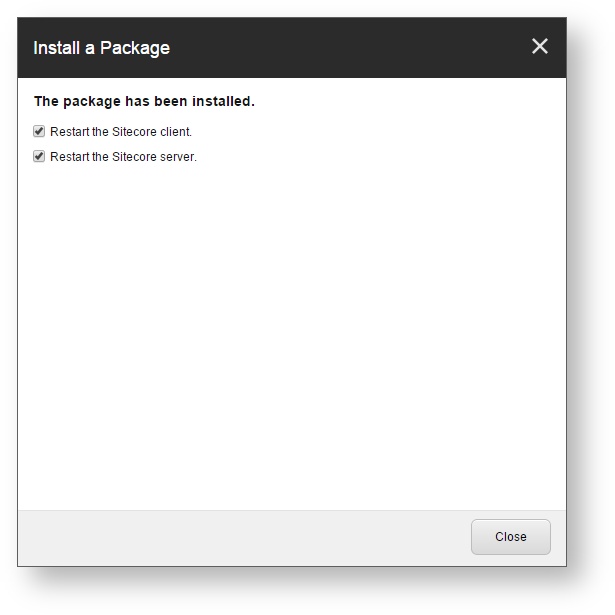February 1, 2019 release (5.0.177.21)
February 1, 2019 release (5.0.177.21)
|
|
Per the Coveo Version Support Lifecycle policy, this Coveo for Sitecore 5 release has been retired. See available Coveo for Sitecore releases. Even if this release is retired, you must still perform some of its upgrade steps to upgrade to a more recent version of Coveo for Sitecore. |
This release includes the 2.4710.8 version of the JavaScript Search Framework (see October 2018 Release (v2.4710.8)).
When using a CDN with the Coveo Hive framework, this release includes the latest 2.4710 version of the JavaScript Search Framework (see Choosing between local and CDN Coveo JavaScript resource files).
Release Notes
This section summarizes the new features and fixed support cases introduced in the Coveo for Sitecore February 1, 2019 release (5.0.177.21).
| Identifier | Enhancement |
|---|---|
| SC-3382 | Remove workaround for Unexpected Token error in the SXA Coveo File Result Template.cshtml file. |
| SC-3386 | [Command Center] Display the Coveo for Sitecore version number at the lower-left corner of the screen. |
| SC-3410 | Allow a user to deny anonymous users access to documents on a specified database (see Deny Anonymous Users Access to the Master Database). |
| SC-3417 | [SXA] Support SXA 1.8. |
| SC-3541 | Clean up unused Control Panel Coveo Search controls. |
| Identifier | Case | Fixed support case |
|---|---|---|
| SC-3465 | 00041734 | Added handling of empty header names when creating a Search REST API HTTP request. |
| Identifier | Bug fix |
|---|---|
| SC-3434 | [SXA] Added error handling when editing rendering data sources in the Experience Editor. |
| SC-3462 | [Command Center] Fixed issue with user not being able to save new included fields after a Sitecore field name change. |
| SC-3479 | [Command Center] Added error handling on Coveo for Sitecore activation process. |
| SC-3488 | Fixed Could not find property skipFirstTimeSetupCheck content delivery server issue. |
| SC-3489 | Fixed issue to support Sitecore field names containing hyphens. |
Upgrade Steps
|
|
Per the Coveo Version Support Lifecycle policy, this Coveo for Sitecore 5 release has been retired. See available Coveo for Sitecore releases. Even if this release is retired, you must still perform some of its upgrade steps to upgrade to a more recent version of Coveo for Sitecore. |
This section describes how to upgrade Coveo for Sitecore from December 21, 2018 (5.0.140.19) to February 1, 2019 (5.0.177.21). If you're upgrading over multiple versions, Coveo has a procedure to streamline the process.
|
|
For the best Coveo for Sitecore experience, always follow the Best Practices When Upgrading Coveo for Sitecore. |
Step 1: Upgrade Coveo for Sitecore
|
|
Make sure the Microsoft MVC security update MS14-059 is installed on every Sitecore host in your environment. |
-
Log in to the Sitecore Desktop.
-
Access the Installation Wizard (Sitecore Start Menu > Development Tools > Installation Wizard).
-
Upload and install the
Coveo for Sitecore <SITECORE_VERSION> 5.0.177.21package. -
When prompted to overwrite files, click Yes to all.
-
When prompted to overwrite items, select Overwrite, then click Apply to all.
NoteYou might be prompted twice with this question. Select the Overwrite option and click Apply to all both times.
-
Once the installation is completed, make sure that you restart both the Sitecore client and server.

Step 2: Manually Update the Coveo Configuration Files
The Coveo configuration files are located in the Website\App_Config\Include\Coveo folder. When upgrading, you must compare the changes to the .example files from your current Coveo for Sitecore version with the ones in the build you're upgrading to. Then, you can merge these changes into your current configuration files. This method allows you to keep your own customization intact, while still benefiting from the latest enhancements brought in the product. You can use a merge tool such as WinMerge to accomplish this.
In further detail, here are the modifications that you must perform to the configuration files resulting from the feature changes between the previous and current Coveo for Sitecore releases:
Coveo.SearchProvider.config
Sitecore 9
For Sitecore 9 instances only, the following line has been removed.
<skipFirstTimeSetupCheck role:require="ContentDelivery">true</skipFirstTimeSetupCheck>
|
|
Note
You might already have deleted this line when upgrading from Coveo for Sitecore 4 to Sitecore 5. If you’re currently using Coveo for Sitecore 5 in a multi-server setup and Sitecore isn’t throwing a |
Coveo.SearchProvider.Custom.config
The following block has been added.
<coveoPostItemProcessingPipeline>
<!-- Uncomment this processor to deny anonymous users on items from master database. For more information, see: https://docs.coveo.com/en/2716 -->
<!--
<processor type="Coveo.SearchProvider.Processors.AddSecurityOnItemsWithDatabase, Coveo.SearchProviderBase">
<database>master</database>
</processor>
-->
</coveoPostItemProcessingPipeline>
If you want to deny anonymous users access to master database items, you can enable the processor element by uncommenting it (see Denying Anonymous Users Access to the Master Database).
SwitchMasterToWeb.Coveo.config
For Sitecore 7 and Sitecore 8 instances only, the following line has been removed.
<skipFirstTimeSetupCheck>true</skipFirstTimeSetupCheck>
|
|
Note
You might already have deleted this line when upgrading from Coveo for Sitecore 4 to Sitecore 5. If you’re currently using Coveo for Sitecore 5 in a multi-server setup and Sitecore isn’t throwing a |
Step 3: Publish your site
In the Sitecore Content Editor, perform a publish site action. This ensures any changes related to Coveo components in the upgrade are published to the web database.